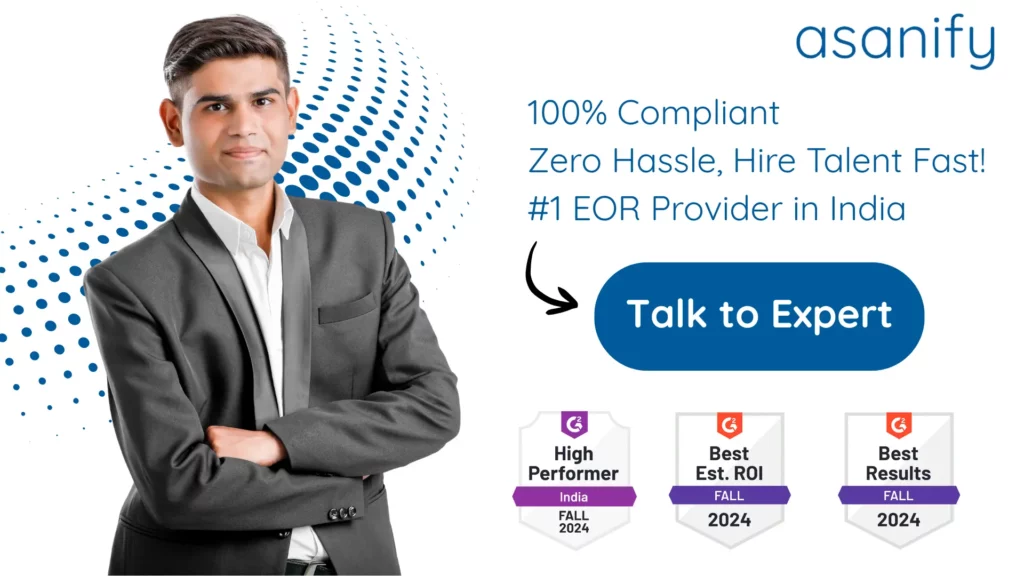In 2025, as mobile-first strategies and cross-platform applications become critical to business growth, companies worldwide are seeking top-tier Kotlin developers to support both Android and backend development. Kotlin, endorsed by Google as the preferred language for Android, is now widely adopted for building robust, scalable apps and microservices.
India has emerged as a global hub for Kotlin talent, offering a powerful combination of technical expertise, cost-efficiency, and strong communication skills. This guide will walk you through why India is the ideal destination to hire Kotlin developers, the technical competencies to look for, compensation benchmarks, sourcing channels, compliance risks, and how to hire effortlessly with an Employer of Record (EOR) partner like Asanify.
Whether you’re a startup building a mobile MVP or an enterprise scaling a microservices architecture, this comprehensive 2025 guide provides everything you need to hire Kotlin developers in India the right way.
Why Hire Kotlin Developers from India in 2025?
India continues to attract global companies as a preferred destination for hiring software developers, especially those proficient in Kotlin. The reasons are multidimensional—ranging from the quality of talent and cost advantage to timezone flexibility and excellent English communication.
India’s Expansive Kotlin Talent Pool
Over the past decade, India has seen explosive growth in its mobile development ecosystem. Thousands of computer science graduates and self-taught developers specialize in Android development using Kotlin. Engineering colleges have updated their curriculum to include modern app development frameworks, and many students graduate with hands-on experience in Kotlin-based applications.
Additionally, the open-source movement and Android-focused developer communities in India (like Google Developer Groups and Kotlin meetups) nurture a collaborative learning environment that produces well-rounded Kotlin developers.
Significant Cost Advantage Over Western Markets
Companies from the United States, United Kingdom, Canada, Germany, and Australia are increasingly turning to India to build dedicated remote teams. The Indian tech talent pool not only delivers high-quality work but also offers cost savings of 40–60% compared to Western salaries. Hiring Kotlin app developers in India allows businesses to scale development affordably without compromising code quality or product velocity.
Fluency in Global Communication and Timezone Compatibility
Indian developers are widely recognized for their strong English proficiency, both spoken and written. Many have worked on projects for clients across North America and Europe, making them familiar with cross-cultural communication and global work standards. Moreover, Indian time zones (GMT+5:30) overlap well with European and US East Coast hours, enabling real-time collaboration with distributed teams.
Whether you’re building a mobile banking solution, a global social media app, or an internal enterprise platform, the availability of seasoned remote Kotlin developers in India makes team extension seamless and effective.
Core Skills to Look for in Indian Kotlin Developers
Choosing the right Kotlin developer involves evaluating both technical depth and collaboration capabilities. Here are the essential skill sets you should prioritize when hiring Kotlin backend or Android developers in India.
Android App Development Expertise
Top Kotlin Android developers in India have in-depth knowledge of:
- Android SDK
- Jetpack Compose
- Material Design principles
- Android Architecture Components (LiveData, ViewModel, Room, Navigation)
- Dependency injection tools like Dagger or Hilt
They can design scalable, high-performance mobile applications while adhering to modern Android design and security standards.
Kotlin for Backend Services
Beyond mobile apps, Kotlin is gaining traction in backend development using frameworks such as:
- Ktor – for lightweight web applications and microservices
- Spring Boot – for enterprise-grade backend APIs and services
If your project involves building APIs, server-side applications, or microservices, Kotlin backend developers in India bring strong backend logic skills along with concurrency, testing, and database management proficiency.
Experience with RESTful APIs and Firebase
Modern mobile apps rely on RESTful API integrations and cloud-based services. Experienced Kotlin developers should know how to:
- Integrate third-party APIs
- Work with Firebase modules (Authentication, Firestore, Analytics, Crashlytics)
- Implement secure data communication and OAuth flows
This skill is crucial for seamless feature delivery and real-time user experiences.
Proficiency in Testing and Debugging Tools
Top-tier developers prioritize code quality. Tools commonly used by Indian Kotlin developers include:
- Espresso for UI testing
- JUnit and Mockito for unit and integration testing
- Android Debug Bridge (ADB) for device-level diagnostics
Hiring developers skilled in these areas reduces production issues and increases application stability.
Version Control and Agile Collaboration
Effective remote development hinges on version control and collaborative practices. Proficient Kotlin developers should be adept at:
- Using Git, GitHub, GitLab, or Bitbucket
- Participating in code reviews and pull requests
- Following Scrum/Agile workflows using Jira or Trello
- Documenting their work for knowledge sharing
These soft and hard skills are critical for building reliable offshore teams that integrate smoothly with your in-house team.

Kotlin Developer Salary Benchmarks in India (2025)
Understanding the cost of hiring developers in India helps in planning your team and budget. Here’s a breakdown of average Indian Kotlin developer salary expectations by experience level:
| Experience Level | Salary in INR (Annual) | Approximate USD Equivalent |
| Junior (0–2 years) | ₹4 – ₹6 LPA | $5,000 – $7,000 |
| Mid-Level (2–5 years) | ₹7 – ₹12 LPA | $8,000 – $14,000 |
| Senior (5+ years) | ₹15 – ₹25 LPA | $18,000 – $30,000 |
Salaries can vary depending on:
- Developer’s location (e.g., Bengaluru and Pune vs Tier-2 cities)
- Android vs Backend specialization
- Domain knowledge (e.g., fintech, e-commerce)
- Employment model (freelancer vs full-time vs via EOR)
These salary brackets reflect the current market rates for Indian Kotlin developer salary in 2025, giving companies flexibility to scale teams affordably.
Suggested Read: Hire AI Engineers in India: A 2025 Global Company’s Guide
Where to Source Kotlin Developers in India
With growing demand, several platforms and channels have emerged to connect global businesses with Kotlin developers in India. Let’s compare the most effective options.
Freelancing Platforms
Websites like Upwork, Toptal, and Freelancer offer access to short-term Kotlin freelancers. While suitable for time-bound projects or prototyping, this model lacks:
- Long-term reliability
- Legal protections (especially for IP)
- Employment compliance
Tech Job Boards and Social Hiring
Platforms like Naukri, LinkedIn, and AngelList India are widely used for direct hiring. They give access to verified profiles and full-time availability but require internal effort for:
- Screening and interviews
- Offer negotiation
- Contract and payroll setup
Developer Agencies and Outsourcing Companies
For businesses that want a pre-assembled team, Kotlin-focused development agencies offer:
- Project managers
- QA testers
- Mobile developers
However, this model can be costlier and less flexible in terms of team control or code ownership.
Employer of Record (EOR) Services like Asanify
EOR platforms like Asanify combine the benefits of full-time hiring with zero compliance headaches. With Asanify, you can:
- Hire vetted Kotlin developers in India as full-time employees
- Issue legally compliant contracts
- Handle monthly payroll and statutory deductions
- Retain full IP ownership
This is the safest and fastest way to build a dedicated remote team without establishing a legal entity in India.

Hiring Models: Choosing the Right Fit
When planning to hire Kotlin developers in India, it’s important to evaluate the different engagement models available. Each model offers its own set of advantages and challenges depending on your project’s scale, duration, and compliance requirements. Selecting the right hiring strategy can greatly impact your team’s productivity, budget, and legal standing—especially if you’re working across borders.
Freelance Model
The freelance model is best suited for short-term tasks or highly specific deliverables. It works well when you need developers to quickly fix bugs, build MVP features, or support legacy apps on a project basis.
Use Cases:
- Prototyping mobile apps or testing a new feature
- Temporary support for internal engineering teams
- Projects with limited timelines and budgets
Pros:
- Fast hiring and immediate onboarding
- Minimal paperwork or upfront commitment
- Generally cost-effective for small scopes of work
Cons:
- Limited control over timelines and quality assurance
- No formal employment relationship, which can complicate ownership of deliverables
- Lack of IP protection, confidentiality enforcement, or long-term stability
- Increased risk of misclassification if used repeatedly
Full-Time Remote Hiring
This model involves hiring Indian Kotlin developers directly as remote full-time employees. It is ideal when you want dedicated engineers who are fully integrated into your product roadmap and team culture.
Use Cases:
- Building and maintaining long-term product infrastructure
- Managing iterative sprints and agile workflows
- Need for full-time contributors who align with company goals
Pros:
- Greater accountability, ownership, and collaboration
- Seamless integration into daily stand-ups, retrospectives, and sprint planning
- Developers become deeply familiar with your architecture and user base
Cons:
- Navigating Indian labor law compliance is complex
- Requires you to manage payroll, income tax (TDS), PF/ESI contributions, and issue compliant contracts
- Legal risk if employment terms or local mandates are mishandled
- Setting up your own legal entity in India involves time, cost, and administrative effort
Hiring via Employer of Record (EOR)
An Employer of Record model offers the best of both worlds—allowing you to employ full-time Kotlin developers in India without setting up a local legal entity. The EOR acts as the legal employer, while you manage day-to-day work and team alignment.
Best For:
- Global companies expanding into India
- Startups and enterprises without Indian HR or legal infrastructure
- Tech teams needing long-term team scalability with compliance assurance
Benefits:
- Fully compliant local employment contracts drafted under Indian labor laws
- End-to-end payroll processing, tax deductions, and statutory benefits handled for you
- IP protection, NDAs, and confidentiality agreements included in the employment lifecycle
- Reduced administrative burden and cost compared to setting up a subsidiary
This model is highly recommended for building sustainable, full-time remote teams of Employer of Record Kotlin developers in India, especially if you’re focused on long-term product development without getting bogged down in complex legal and HR processes. An EOR like Asanify empowers you to focus on innovation and team outcomes while it takes care of legal, tax, and operational compliance behind the scenes.
Compliance, Legalities, and Tax Obligationsp
When hiring Kotlin developers in India as part of your global expansion strategy, it’s critical to understand and comply with local employment laws and tax regulations. Failure to do so can expose your company to significant legal and financial risks—including lawsuits, fines, employee misclassification issues, and potential loss of intellectual property rights. Here’s a detailed breakdown of the core compliance areas you must address when building a remote Kotlin development team in India.
Correct Worker Classification
One of the most common risks global employers face is the misclassification of workers. Under Indian labor law, there’s a clear distinction between independent contractors and full-time employees. Contractors are not entitled to statutory benefits, while employees must receive paid leave, contributions to government-mandated insurance schemes, and severance under certain conditions. Misclassifying an employee as a contractor can lead to retrospective tax penalties, legal claims for unpaid benefits, and even reputational damage. When you partner with an Employer of Record (EOR) like Asanify, worker classification is handled accurately in accordance with Indian regulations, safeguarding your business from compliance breaches.
Contracts, NDAs, and IP Ownership
To protect your product, brand, and technology stack, it is essential that your employment agreements are well-structured and legally enforceable under Indian law. These contracts must include clauses for:
- Non-Disclosure and Confidentiality: Ensures sensitive information, including business strategies, source code, and user data, is not disclosed or misused.
- Intellectual Property Assignment: Clarifies that all work products, including source code, APIs, and designs created during the course of employment, legally belong to the employer.
- Non-Compete and Non-Solicitation: Optionally included to prevent developers from working with direct competitors or poaching team members post-employment.
An EOR like Asanify drafts these contracts in accordance with Indian labor laws, ensuring that your rights as an employer are clearly protected and legally binding.
Payroll Management and Statutory Deductions
Employers operating in India are required by law to manage various statutory components of employee compensation. This includes:
- Provident Fund (PF): A retirement benefit scheme that mandates both employer and employee contributions.
- Employee State Insurance (ESI): Provides medical and social security benefits to employees earning below a certain threshold.
- Professional Tax: Levied by state governments on salaried individuals, typically deducted monthly.
- Income Tax Deducted at Source (TDS): Employers are responsible for deducting and remitting income tax from employee salaries as per the applicable tax slabs.
These obligations can be complex and vary by state and salary bracket. Mistakes in deduction or late filings can result in penalties and employee dissatisfaction. By working with an EOR like Asanify, all of these payroll-related compliance tasks are automated and managed accurately. From salary disbursal and payslip generation to TDS returns and labor welfare contributions, Asanify takes full responsibility, allowing your leadership team to focus on growth and productivity instead of local paperwork.
In summary, understanding and adhering to Indian labor laws is not optional—it is a fundamental requirement when you hire Kotlin developers in India. EOR partners play a crucial role in reducing your compliance burden while ensuring your operations remain legally sound and employee-friendly.
Why Partner with Asanify to Hire Kotlin Developers in India
Asanify is a top Employer of Record (EOR) service that helps global companies hire Kotlin developers in India quickly and compliantly—without setting up a local entity. It streamlines hiring by providing access to pre-vetted talent and onboarding them within 5–7 business days using Indian labor law–compliant contracts. Asanify manages the full HR and payroll lifecycle, including salary disbursement, payslip generation, income tax (TDS), Provident Fund (PF), and Employee State Insurance (ESI) contributions. All tax filings and statutory obligations are handled automatically. Employers retain full IP rights through enforceable Indian contracts, ensuring security over code, design assets, and infrastructure. For businesses scaling remote teams, Asanify eliminates legal complexity and operational overhead. With no entity setup required and complete compliance support, it enables companies to build high-performing Kotlin development teams in India while staying focused on innovation and growth.

How to Onboard Kotlin Developers in India Remotely
Once you’ve finalized your choice and selected the right Kotlin developer(s), the next crucial step is onboarding. A structured and well-planned onboarding process ensures faster productivity, better team integration, and a smoother overall transition into your product development workflow. Whether your Kotlin hire is focused on Android apps, backend systems, or full-stack features, onboarding them efficiently will greatly impact their performance and retention.
Below are the key steps to onboard remote Kotlin developers from India effectively, especially when hiring through a trusted Employer of Record (EOR) like Asanify.
1. Issue Contracts and Offer Letters
Begin the onboarding process by issuing all necessary legal and HR documents. When hiring through Asanify, you can generate fully compliant Indian employment contracts and offer letters with just a few clicks. These documents are tailored to meet Indian labor law standards and typically include:
- Salary Breakdown: Clear division of gross salary, fixed pay, allowances, performance bonuses, and statutory benefits like Provident Fund (PF) and Employee State Insurance (ESI).
- Leave Policy: Define the number of paid leaves, sick leaves, and national holidays the developer is entitled to under Indian law.
- Probation and Notice Terms: Clearly specify the probation period (commonly 3–6 months), termination clauses, and applicable notice period requirements.
These contracts also include confidentiality agreements, IP ownership clauses, and non-disclosure terms that protect your business assets. By automating this with Asanify’s platform, you ensure the developer signs enforceable agreements governed by Indian law without any manual overhead.
2. Grant Access to Tools and Repositories
Once the paperwork is complete, the next step is setting up the remote development environment. This phase is essential for equipping the new hire with all the tools and access rights they need to contribute productively from day one. Depending on your tech stack and collaboration preferences, you should provide access to:
- Code Repositories: Add the developer to your GitHub, GitLab, or Bitbucket repositories. Ensure proper branch permissions and access controls are in place.
- Communication Platforms: Integrate them into team channels on Slack, Microsoft Teams, or Discord. Set up direct lines of communication with their reporting manager or mentor.
- Project Management Tools: Onboard the developer to tools like Jira, Trello, or ClickUp, and walk them through how tasks are assigned, tracked, and prioritized.
- Design and Documentation Access: Provide access to Figma, Notion, Confluence, or internal documentation hubs so they understand your brand standards and product roadmap.
Additionally, ensure they have credentials to CI/CD pipelines, staging servers, database environments, or Firebase dashboards—based on their specific responsibilities. This reduces downtime and accelerates initial contributions.
3. Set Goals and Define Metrics for the First 90 Days
Defining clear goals and performance metrics from the beginning is key to aligning expectations and evaluating early progress. A structured 30-60-90 day onboarding plan helps Kotlin developers ramp up efficiently and understand their role in the broader context of your engineering team.
Here’s how to approach each stage:
First 30 Days: Orientation and Initial Contribution
- Understand codebase structure and tech stack
- Set up the local environment and complete onboarding tasks
- Fix minor bugs or complete low-risk tasks to get familiar with workflows
- Attend product walkthroughs and architecture deep-dives
Days 31–60: Deeper Integration and Feature Ownership
- Take ownership of small modules or new feature implementations
- Contribute to sprints actively and attend daily standups
- Begin peer code reviews and provide feedback
- Participate in QA cycles and deployment testing
Days 61–90: Independent Execution and Impact
- Lead larger feature rollouts or backend service updates
- Propose improvements to code structure, performance, or UI/UX
- Support other team members or mentor junior developers if applicable
- Complete performance reviews and retrospective feedback sessions
Having these expectations clearly documented creates a mutual understanding of success and helps remote Kotlin developers integrate into your team and culture with confidence.
Suggested Read: Hire Cloud Developers in India: A 2025 Guide for Global Businesses
Conclusion
The demand for skilled Kotlin developers continues to rise globally, and India stands out as the go-to destination for hiring top-tier talent. From Android mobile apps to cloud-based backend systems, Indian developers bring agility, scalability, and innovation to global teams.
By partnering with a trusted Employer of Record like Asanify, you can hire Kotlin developers in India confidently, affordably, and in full legal compliance—without opening a branch or navigating labor law complexities.Ready to transform your product roadmap with expert Kotlin talent from India?
Let Asanify make it easy, secure, and scalable.
FAQs
Salaries range from ₹4–6 LPA for juniors to ₹15–25 LPA for senior developers, depending on experience and role.
Yes, using an Employer of Record (EOR) like Asanify enables compliant hiring without the need for a local company.
Freelancers offer flexibility for short-term tasks, while full-time hires provide stability, control, and deeper integration.
Yes, many have worked on international mobile and backend projects for US, UK, and EU-based companies.
You’ll need an offer letter, employment contract, NDA, and IP assignment—handled by EOR platforms like Asanify.
With pre-vetted candidates, onboarding can be completed in 5–7 business days.
No, Indian developers also use Kotlin for backend development with frameworks like Ktor and Spring Boot.
Use Indian-compliant NDAs and IP assignment agreements—EORs ensure enforceability under local laws.
Hourly rates range from $12–$25 based on experience and specialization (Android or backend).
Bengaluru, Hyderabad, Pune, and NCR are top hubs for skilled Kotlin app and backend developers.
Not to be considered as tax, legal, financial or HR advice. Regulations change over time so please consult a lawyer, accountant or Labour Law expert for specific guidance.

